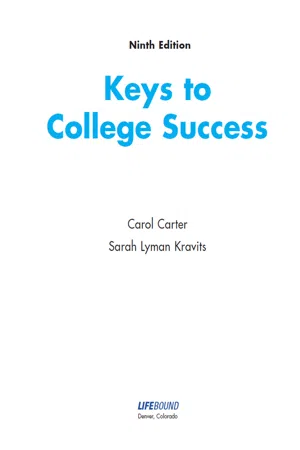
Keys to College Success
COVID-19 Success Updates and Coaching Included
- 348 pages
- English
- ePUB (mobile friendly)
- Available on iOS & Android
About this book
For First Year Experience, Student Success, and Introduction to College courses for students attending four year programs. Keys to College Success sets the standard for connecting academic success to success beyond school, showing students how to apply strategies within college, career, and life. The Ninth Edition retains its tried-and-true emphasis on thinking skills and problem solving, re-imagined with two goals in mind: a risk and reward framework that reflects the demands today's students face, and a focus on student experience specific to four-year schools with a more extensive research base and increased metacognition. Keys to College Success provides the established KEYS set of tools for success—an understanding of how coursework connects to career and life goal achievement, and analytical, creative, and practical thinking coverage that empowers a range of cognitive ability. This content provides:
- COVID-19 Update: College students in 2020 need relevant information during the unprecedented time of COVID-19. This update of Keys to College Success includes up-to-the minute information on digital and distributed learning strategies and practical tips on resilience, persistence, purpose, and strength.
- College Connection to Career and Life Goals: Infused with a focus on risk and reward, showing that the reward of success in the modern world demands a risk of vision and persistent effort over time. It raises the bar to show students that they must risk action to grow, thrive, and contribute in order to make their college investment pay off in gainful employment, meaningful work, and community involvement.
- Thinking Skills coverage: Comprehensive content with research references lend credibility and perspective to concepts, targeted exercises that explore personally relevant situations in context, and sustained focus throughout each topic.
- Tailored to the four-year program experience: Acknowledges global economic change and instability and hones in on student concerns about employability skills and debt management so the four-year college experience is framed in practical, work-relevant ways even as it supports the value of a liberal education. New coverage of resources, topics, and research support concepts.
Frequently asked questions
- Essential is ideal for learners and professionals who enjoy exploring a wide range of subjects. Access the Essential Library with 800,000+ trusted titles and best-sellers across business, personal growth, and the humanities. Includes unlimited reading time and Standard Read Aloud voice.
- Complete: Perfect for advanced learners and researchers needing full, unrestricted access. Unlock 1.4M+ books across hundreds of subjects, including academic and specialized titles. The Complete Plan also includes advanced features like Premium Read Aloud and Research Assistant.
Please note we cannot support devices running on iOS 13 and Android 7 or earlier. Learn more about using the app.
Information

The Rewards of College




WHY IS COLLEGE A RISK,
and what reward does it offer?
The Value of Risk in the Modern World

The Rewards of College
A liberal arts education
Table of contents
- Cover
- Title Page
- Copyright
- About the Authors
- Breif Contents
- Preface
- Update: College During the COVID-19 Pandemic
- Chapter 1 The Rewards of College: What Are You Willing to Risk to Reach Your Goals?
- Chapter 2 Goals, Time, and Stress Management: What Trade-Offs Are You Willing to Make?
- Chapter 3 Emotional and Physical Wellness: How Healthy Are You Willing to Be?
- Chapter 4 Personality and Learning Preferences: Who Are You and What Makes You Unique?
- Chapter 5 Critical, Creative, and Practical Thinking: How Can You Maximize Brain Power?
- Chapter 6 Reading, Research, and Writing: How Can You Develop Deep Understanding?
- Chapter 7 Note Taking, Memory, and Studying: How Can You Retain What You Learn?
- Chapter 8 Test Taking: How Can You Show What You Know?
- Chapter 9 People, Resources, and Opportunities: How Can You Make the Most of College Life?
- Chapter 10 Plan for Career Success: What Is Your Purpose and Your Passion?
- Chapter 11 Mathematical and Financial Literacy: How Can You Be Money Smart?
- Chapter 12 Thriving in a Diverse Global Community: How Can You Communicate Effectively and Make a Difference?
- Endnotes
- Index